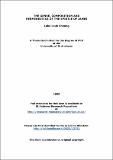The genre, composition and hermeneutics of the Epistle of James
Abstract
The present thesis aims to determine the genre, the compositional structure and the hermeneutics found in the letter of James. It is divided into five parts. Part one first examines the various proposals for the genre of James. James is found to be a "counter cultural" wisdom instruction challenging the hearers' worldview and to reorient them to the values acceptable to God. Part two examines the previous attempts to uncover the structure of James. Here I adopt discourse analysis, paying special attention to the formal features of wisdom instruction. Part three explores the importance of law and wisdom to the understanding of the hermeneutics of James. James is using the love command as hermeneutical principle in understanding the Torah and is comparable to that in Matthew. Wisdom, a gift from God, is involved in the "how" of the important hermeneutical task of applying and keeping the law in one's particular situation. It also manifests itself in one's keeping of the law. Part four investigates the meaning of the call to perfection and the predicament of doubleness in relation to law and wisdom in the context of early Jewish and Christian thought. By adhering to the implanted word, doing what this word/law requires, Christians will be on the way to perfection and to life/salvation. Part five looks at the importance of eschatology which provides the underlying framework for the hermeneutics found in James.
In conclusion, James is seen as a wisdom instruction which adapts the teaching of Jesus, making it relevant to his readers. Our author exhorts his readers, the messianically renewed people of God, redeemed by the word of truth, to move along the way of perfection in obedience to the law, waiting for the coming of the Lord at the end of this age.
Type
Thesis, PhD Doctor of Philosophy
Collections
Items in the St Andrews Research Repository are protected by copyright, with all rights reserved, unless otherwise indicated.

